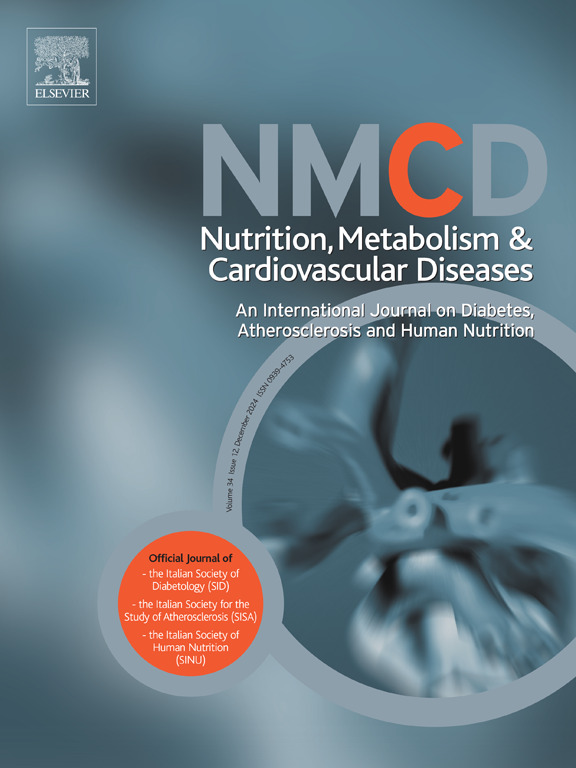Causal relationship between serum 25-hydroxyvitamin D and coronary heart disease: A bi-directional two-sample Mendelian randomization study
IF 3.3
3区 医学
Q2 CARDIAC & CARDIOVASCULAR SYSTEMS
Nutrition Metabolism and Cardiovascular Diseases
Pub Date : 2025-03-26
DOI:10.1016/j.numecd.2025.104020
引用次数: 0
Abstract
Background and aim
Coronary heart disease (CHD) is the leading cause of severe cardiovascular events, such as acute myocardial infarction. This study investigates the interaction between serum 25-hydroxyvitamin D (25(OH)D) levels and CHD. However, most current studies are observational, which may introduce bias into the results.
Methods and results
We conducted a two-way, two-sample Mendelian randomization study. The CHD sample was drawn from the 2021 population in the FinnGen database (cases: 21,012; controls: 197,780), while the serum 25(OH)D sample was obtained from the 2020 European population in the GWAS Catalog database (417,580 cases). Based on the inverse variance weighted (IVW) results, we found that the risk of CHD decreased with increasing serum 25(OH)D concentrations (P < 0.05), and that higher CHD risk was associated with lower serum 25(OH)D concentrations (P = 0.04).
Conclusions
Our study found that increased serum 25(OH)D concentration may serve as a protective factor against CHD. Additionally, we found that CHD can be a risk factor that affects serum 25(OH)D concentrations in humans.
血清25-羟基维生素D与冠心病的因果关系:一项双向双样本孟德尔随机研究
背景与目的:冠心病(CHD)是急性心肌梗死等严重心血管事件的主要原因。本研究探讨血清25-羟基维生素D (25(OH)D)水平与冠心病的相互作用。然而,目前大多数研究都是观察性的,这可能会给结果带来偏见。方法与结果:我们进行了一项双向、双样本孟德尔随机化研究。冠心病样本来自FinnGen数据库中的2021年人群(病例:21,012例;对照组:197,780例),而血清25(OH)D样本来自GWAS目录数据库中的2020年欧洲人群(417,580例)。根据逆方差加权(IVW)结果,我们发现随着血清25(OH)D浓度的升高,冠心病的风险降低(P)。结论:我们的研究发现血清25(OH)D浓度升高可能是预防冠心病的保护因素。此外,我们发现冠心病可能是影响人类血清25(OH)D浓度的危险因素。
本文章由计算机程序翻译,如有差异,请以英文原文为准。
求助全文
约1分钟内获得全文
求助全文
来源期刊
CiteScore
6.80
自引率
2.60%
发文量
332
审稿时长
57 days
期刊介绍:
Nutrition, Metabolism & Cardiovascular Diseases is a forum designed to focus on the powerful interplay between nutritional and metabolic alterations, and cardiovascular disorders. It aims to be a highly qualified tool to help refine strategies against the nutrition-related epidemics of metabolic and cardiovascular diseases. By presenting original clinical and experimental findings, it introduces readers and authors into a rapidly developing area of clinical and preventive medicine, including also vascular biology. Of particular concern are the origins, the mechanisms and the means to prevent and control diabetes, atherosclerosis, hypertension, and other nutrition-related diseases.

 求助内容:
求助内容: 应助结果提醒方式:
应助结果提醒方式:


